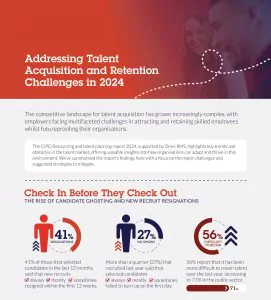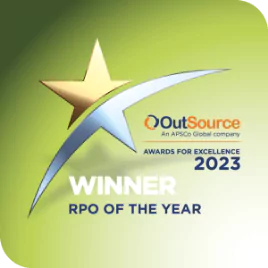The Rise of Candidate Ghosting




Candidate ghosting – when a candidate disengages from the hiring process after accepting an offer – is a growing challenge that significantly impacts businesses. In the CIPD’s Resourcing and talent planning report 2024, it was observed that for those organisations that recruited in the last 12 months, more than a quarter (27%) of selected candidates always, mostly, or sometimes failed to turn up on the first day, effectively “ghosting” the employer. This phenomenon not only disrupts operations but also increases recruitment costs and delays project timelines.
There are many reasons behind the high incidence of this phenomenon but there are proposed actionable strategies to mitigate it. At Omni, we believe that the stakes are high, and as organisations invest heavily in attracting key talent, losing candidates late in the game due to poor communication can derail growth plans and hit the bottom line hard. Tackling this with dedicated resources and tech to keep candidates engaged between offer acceptance and start date can have great results and mitigate ghosting and dropouts, proving that a focused engagement strategy can make a significant difference in securing top talent.

According to the latest insights from the CIPD’s Resourcing and talent planning report, vacancies are dropping in the current labour market, while the demand for skilled talent remains high. Talent Acquisition teams must be creative to find key talent because the best talent is still highly sought after and often well-looked-after by their current employers. Attracting passive candidates requires much more effort than ever before. It’s no longer about salary as candidates’ career motivators now include job security, value alignment and flexible working, according to Katie Noble, Omni’s Talent Strategy Director.


At Omni, we have ourselves invested in additional resources and tech dedicated solely to keeping candidates engaged in the period between job offer and start date on behalf of our client partners who don’t have the internal resources to manage this, reducing ghosting and dropouts by 30%. - Louise Shaw, Managing Director at Omni RMS
In today’s uncertain economic climate, job security and alignment with personal values are critical motivators for candidates. When these aspects are not sufficiently addressed during the recruitment process, candidates may choose to opt out, even after accepting an offer. It’s important to note that if a candidate is speaking to you, they’re most certainly speaking to other potential employers. Ensuring transparency and clear communication during the onboarding process is key to keeping the candidate engaged. Candidates want to feel valued and informed at every stage of the hiring process. This means maintaining consistent communication from the moment they apply until well into their employment
According to the CIPD’s Resourcing and talent planning report the number of respondents who took action in the last year to improve their employer brand improved their candidate experience rose from 15% to 24%.
Candidate ghosting can be attributed to a breach in the psychological contract – which is the unwritten set of expectations between employer and employee. Many employers rush the assessment and onboarding process, failing to provide candidates with enough information or engagement to confirm that they have made the right decision. Candidates need to be made to feel ‘face validity’ which means that the selection process is appropriate for the level of role. Getting this right, and not rushing will make the candidate feel they will be valued in their new organisation.

The interview is not just an assessment – it’s also a chance for candidates to determine if the organisation is the right fit for them. A rushed or poorly executed interview process can leave candidates feeling uncertain and undervalued. Employers should ensure that interviews are comprehensive and reflective of the company’s culture and values, with a focus on drawing candidates in rather than screening them out.
A smooth and engaging onboarding process is crucial. Once an offer is accepted, the responsibility for onboarding should transition to the new manager. This allows the candidate to build a relationship with their future team, creating a sense of belonging and investment in the role. Omni recommends implementing a high-touch, involved approach where the manager plays a key role in welcoming and integrating the new hire.
Communication is key to reducing ghosting. From the initial application to the final stages of onboarding, consistent and clear communication helps to set expectations and keep candidates engaged. Employers should ensure that candidates are regularly updated and that any queries or concerns are promptly addressed.

“To attract and keep a broad pool of candidates, organisations need strong recruitment and retention strategies. Clear communication during recruitment and a supportive induction are essential for engaging new employees and improving retention”. Claire McCartney, policy and practice manager at the CIPD
To prevent candidate ghosting, it’s essential to regularly review and optimise your hiring processes. Go back to the beginning and this includes a detailed examination of your recruitment and selection procedures, ensuring they are candidate-centric. Training for hiring managers should be a priority, focusing on inclusive selection and effective communication strategies.
From the outset, candidates should be made aware of what the role entails, the company’s expectations, and the next steps in the process. This clarity helps to reduce misunderstandings and keeps candidates aligned with the organisation’s goals and values.

Candidate ghosting is a significant issue that requires a proactive approach. By focusing on improving the candidate experience, enhancing communication, and refining the onboarding process, organisations can mitigate the risk of no-shows and secure the best talent. At Omni, we believe that the key to reducing candidate ghosting lies in building strong, positive relationships with candidates from the very beginning of the hiring process, ensuring they feel valued, informed, and committed to their new role.
Investing in these strategies will not only reduce ghosting but also enhance overall recruitment outcomes, leading to a more engaged and productive workforce.

RPO, or Recruitment Process Outsourcing, is a strategic approach to talent acquisition where organisations outsource some or all of their recruitment processes to an external provider.
In traditional hiring, organisations typically manage recruitment processes in-house, from sourcing candidates to onboarding. This often requires significant time, resources, and expertise from internal HR teams or hiring managers. However, traditional hiring methods can sometimes struggle to keep pace with changing talent demands, especially in industries facing skill shortages or rapid growth.
RPO offers a holistic and strategic approach to talent acquisition. RPO providers like Omni act as an extension of an organisations brand, assuming responsibility for recruitment activities such as candidate attraction, sourcing, screening, assessment, and even onboarding. By outsourcing these functions to specialised experts, organisations can benefit from industry knowledge, resources, and technology to give access to the best talent at pace.
One of the key differences between RPO and traditional hiring lies in the level of specialisation and scalability offered by recruitment RPO providers. RPO partners often have dedicated teams of recruiters who specialise in specific industries or skill sets, allowing them to access niche talent pools and identify high-quality candidates more efficiently. Additionally, RPO solutions are highly scalable, meaning they can quickly adapt to fluctuating hiring needs, whether it’s scaling up recruitment efforts during peak periods or adjusting to changing market conditions.
Recruitment Process Outsourcing (RPO) can significantly enhance your Talent Acquisition strategy by providing specialised expertise, scalability, and strategic partnership. Here’s how:
Specialised Expertise: RPO providers have dedicated teams of recruiters who specialise in various industries, roles, and skill sets. These experts possess in-depth knowledge of the labour market, industry trends, and sourcing techniques, allowing them to identify and attract high-quality candidates efficiently. By leveraging their specialised expertise, RPO partners, like Omni, can access niche talent pools and ensure high-quality people for your organisation.
Scalability: One of the key advantages of recruitment RPO is its scalability. RPO providers can quickly scale recruitment efforts up or down based on your organisation’s hiring needs. Whether you’re experiencing rapid growth, seasonal fluctuations, or project-based hiring spikes, RPO can adapt to accommodate your changing requirements. This flexibility ensures that you have the right resources in place to meet demand without overburdening your internal HR team or sacrificing recruitment quality.
Cost-Effectiveness: RPO recruitment can offer cost savings when compared to traditional hiring methods. While there may be an initial investment in outsourcing recruitment to an RPO partner, the long-term benefits often outweigh the costs. RPO can help reduce time-to-fill, cost-per-hire, and turnover rates, resulting in overall cost savings for your organisation.
Strategic Partnership: RPO goes beyond transactional recruiting by forging a strategic partnership between the RPO partner, like Omni, and your organisation. At Omni, we become an extension of your employer brand and we work closely to understand business objectives, culture, and talent requirements. This collaborative approach allows RPOs to tailor recruitment strategies that align with your organisation’s goals. By working as an extension of your HR team, RPO providers can provide valuable insights, leading practices, and innovative solutions to help achieve talent acquisition objectives.
There are several key advantages:
Access to Specialised Expertise: RPO providers have dedicated teams of recruiters who specialise in various industries, roles, and skill sets. This expertise allows them to identify and attract high-calibre talent more efficiently than internal HR teams or traditional recruitment agencies.
Scalability: RPO recruitment solutions are highly scalable, meaning they can quickly adapt to fluctuating hiring needs. Whether your organisation is experiencing rapid growth, seasonal fluctuations, or project-based hiring spikes, RPO can flexibly adjust to accommodate your changing requirements.
Cost Savings: RPO can offer cost savings compared to traditional hiring methods. By outsourcing recruitment processes to an external provider, organisations can reduce time-to-fill, cost-per-hire, and turnover rates, resulting in overall cost savings for the business.
Strategic Partnership: RPO recruitment goes beyond transactional recruiting by fostering a strategic partnership between the RPO provider and the organisation. At Omni, we work closely with our organisations to understand their organisation’s objectives, culture, and talent requirements, allowing us to tailor recruitment strategies that align with the organisation’s goals and values.
Recruitment Process Outsourcing (RPO) is a strategic approach to talent acquisition where organisations outsource some or all of their recruitment processes to an external provider, like Omni. The partner is known as the RPO provider and assumes responsibility for various aspects of the recruitment process, including candidate attraction, candidate sourcing, screening, assessments, interview coordination and onboarding.
Recruitment RPO is about leveraging specialised expertise, technology, and resources to streamline the recruitment process and improve hiring outcomes. Rather than relying solely on internal HR teams or traditional recruitment agencies, organisations partner with RPO providers to access a broader range of talent to enhance efficiency and drive better results.
The specific services offered by RPO providers can vary depending on the needs and preferences of the organisation. That’s the beauty of RPO. Some organisations may opt for end-to-end RPO, where the RPO provider manages the entire recruitment process from start to finish. Others may choose to outsource specific elements of the recruitment process, such as candidate sourcing or interview scheduling, while retaining other aspects.






